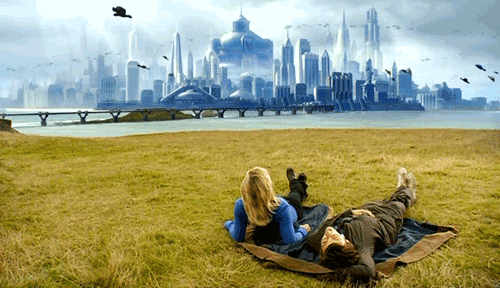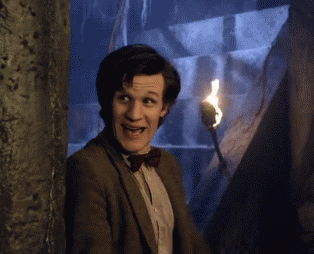"New New Doctor": Companions, Character Development, and Why I'm Dreading the Regenerated Doctor
In my time as a Doctor Who fan, I’ve come across my fair share of anti-Moffat critiques. He’s usually given credit for writing some excellent episodes, but his era as showrunner has generally been criticized for, among other things, a lack of character development, a not inconsiderable degree of sexism, and a set of companions whose lives revolve entirely around the Doctor. I agree with some of these critiques, disagree with others. But I’ve thought about this long and hard, both as an aspiring/studying writer and as a fan, and I’d like to talk about what I perceive to be the main problem with Moffat-era Who: the ignorance of character development/continuity, particularly in how the Doctor learns and changes (or doesn’t) because of his beloved companions.
Image (c) Doctor Who/BBC
In Russell T Davies’s era, as has been pointed out before, there was a significant continuity to all four (five, if you count the 2009 specials as a semi-season) seasons. There was a reason for every change and development in the Doctor, and they were almost always based in his companions’ influence. He learned and changed in every season, and the particular triggers were always clear and natural-seeming. Let’s start with Nine’s change into Ten. Now, Nine had already evolved over Season 1, from someone sharp and severely damaged by war, so much so that he insulted the human race quite casually, into someone with more compassion. And this was first and foremost because of Rose. This was a young woman whose concern was for her mother, her boyfriend, her father, and the Doctor himself- in short, someone who cared about people. She taught him patience and compassion, and he came to love her for it. He willingly sacrificed a regeneration to save her life, because he loved her, because he knew she made him better, because he knew her to be a wonderful person; he acted as she would have.
So when he regenerated into Ten, this new incarnation was born out of love. And in his first few adventures, it became clear that he still had continuity with Nine- none of Nine’s traits were forgotten- and continued the character arc seamlessly. Nine’s darkness was evident in Ten’s first episode, when he did not hesitate to send the Sycorax leader to his death when he tried to backstab the Doctor. But Ten was so giddy and quick and, well, human, you say? Well, yes, he was- and with good reason! In his first adventure, he saved the world with the help of people who had essentially become his family: Rose, Mickey, and Jackie. And then afterwards, he went and had Christmas dinner- all very family-y and warm. But remember the end of that Christmas episode, when Rose still wants to come with him, and he looks like he got the best Christmas present ever? Let’s be the Doctor for a moment: he has a new body, a younger, handsome body (one that Rose clearly likes, let’s be honest), he’s in love, and the woman he loves still wants to be with him. Of course he’s happy! That’s why we see him so relaxed, so human, in the beginning of “New Earth” when he and Rose are lounging on the grass. Character development, and continuity.
Screencap (c) Doctor Who/BBC
Then comes Canary Wharf. And he loses his anchor, his partner, the woman he loves- forever. And not just her, but everyone connected to her, who he’d also come to love. It breaks his hearts absolutely. That’s why Season 3 Doctor is more melancholy. He spends a great deal of that season mourning. In fact, he begins and ends the season on loss: begins having lost Rose, ends having lost the Master (and, soon after, Martha). But he still changes, develops, and that’s thanks to Martha. He learns that he can’t take people for granted. With Rose, they had become so together that they were nearly one unit, so in a way they took each other for granted. Then Martha comes along. She’s smart and brave and doesn’t need the Doctor to tell her so. And when he takes too long to appreciate her, she leaves, and he understands why.
Which is why, come Season 4, he is immediately ready to accept Donna when they reunite. He’s learned his lesson, makes sure she doesn’t want anything more than friendship, and tells her repeatedly that she’s important, she’s special, she’s brilliant. When Martha returns, he treats her better, completely aware of her capability and extremely proud of her- and tells her so. He still has that note of melancholy: not only is Rose still gone (which he hasn’t forgotten), but he now knows for certain that he is the last of his kind, after a brief hope spot when the Master was alive but defeated. And in the end, when his entire family of companions returns, even in despair, there is joy. That scene in the TARDIS with everyone at the controls is a summation of all four years, of the continuous story of many interlinked people that RTD told.
Screencap (c) Doctor Who/BBC
And then we come to Ten’s regeneration time. He lost everyone again, almost immediately after the joy of having everyone around. Rose and Donna and Jackie, gone forever. The others have their own lives to lead. And he goes a little mad. With no one to love, no one to remind him of all he’s learned, he breaks under the grief and loss and utter loneliness. He can’t bear another loss, so he breaks time to save Adelaide- and is shattered when her suicide snaps him back to reality. He is faced with mortality, and it’s then exacerbated with prophecies of his own death. Ten’s regeneration is, again, a choice made to save a loved one- this time Wilf, a man he cares for with a son-like affection. Ten’s farewell tour, full of mournful wistfulness and resignation, sums up all he has learned as Nine and Ten. Asking after Joan Redfern- there’s the recognition of the negative effects he can have, learned from Martha. Saving Martha and Mickey- there’s a thank-you for what they both taught him about waiting too long to appreciate someone. Introducing Jack to Alonso- his realization he can’t save everyone (Steven and Ianto) that he found with Adelaide, Astrid, and Jack himself. Visiting Donna’s wedding- what she showed him about how the ordinary can be extraordinary. And then his final moments. By this point, it’s unlikely he could pilot very well, and as “The Doctor’s Wife” told us, the TARDIS takes him where he needs to go. And here, she took him to Rose, where his final action was one of affection: to see her face and tell her she’d have a great year. He regenerates sadly:
Screencap & dialogue (c) Doctor Who/BBC
And this is where Moffat takes over. Nine’s regeneration into Ten was smooth, effortless, and believable. But here, we go from nearly crying and regenerating in grief and regret to bouncing off the walls! And it doesn’t stop, either; it can’t be chalked up to post-regeneration energy. All of the grief, the weight that Ten carried by the end of his life, is gone, ignored. Instead, Eleven is cheerfully hyperkinetic.
But Ten was cheery too, you say? Ah, but as I said before, he had good reason to be- he had lost Jack, true, but still had Rose and her family and hope for a whole new set of adventures. Eleven did not act at all like a man born in sadness and longing, nor does he seem to remember any lessons he learned as Ten. The way he treats Rory, for instance: After Mickey, Jackie, and even Donna, he knew not to overlook people just because they took a second to keep up. In fact, Rory was much like Martha too- practical, quick-thinking, and logical. Yet the Doctor doesn’t note any of that- he’s too busy being almost condescending and running around with Amy. By the time Eleven loses Amy and Rory, it’s sad indeed, because he genuinely loves them. But he isn’t significantly changed by them; there’s little character development. He’s been reminded of the damage he can do to people, thanks to Rory’s influence, and of the feeling of family, but nothing new.
Screencap (c) Doctor Who/BBC
But Ten was cheery too, you say? Ah, but as I said before, he had good reason to be- he had lost Jack, true, but still had Rose and her family and hope for a whole new set of adventures. Eleven did not act at all like a man born in sadness and longing, nor does he seem to remember any lessons he learned as Ten. The way he treats Rory, for instance: After Mickey, Jackie, and even Donna, he knew not to overlook people just because they took a second to keep up. In fact, Rory was much like Martha too- practical, quick-thinking, and logical. Yet the Doctor doesn’t note any of that- he’s too busy being almost condescending and running around with Amy. By the time Eleven loses Amy and Rory, it’s sad indeed, because he genuinely loves them. But he isn’t significantly changed by them; there’s little character development. He’s been reminded of the damage he can do to people, thanks to Rory’s influence, and of the feeling of family, but nothing new.
When he was mourning in “The Snowmen”, I thought maybe things would change. Nope. One or two episodes in, and it’s as if the Ponds never existed; he’s cheery and unchanged for the most part. And unlike in the RTD era, Moffat’s Doctor essentially never references his past or his past companions to his current ones. Ten talked about Rose to Martha, and Martha to Donna. Rose and Jack, Jack and Martha, Martha and Donna, Sarah Jane and Rose, Sarah Jane and Mickey, Mickey and Jack- all were friends and shared stories. But Eleven never mentions his past companions to the Ponds, not once. Nor does he mention the Ponds, his beloved best friends, to Clara.
This is why I’m dreading Eleven’s regeneration and the rise of Twelve. Not because I don’t want a new Doctor- that’s part of the magic of the show, and I’ll be okay with that. But what I fear is that it’ll be another whiplash, just like the regeneration scene itself, another discontinuous transition, and another would-be big change that’s actually no more than cosmetic. Recent comments by Peter Capaldi have been reassuring, but I fear an actor can only have so much influence. Ten once called himself the “new new Doctor”, but he grew and developed logically and never forgot his past. Under Moffat, “new new Doctor” has been taken a little too far.
















0 comments: